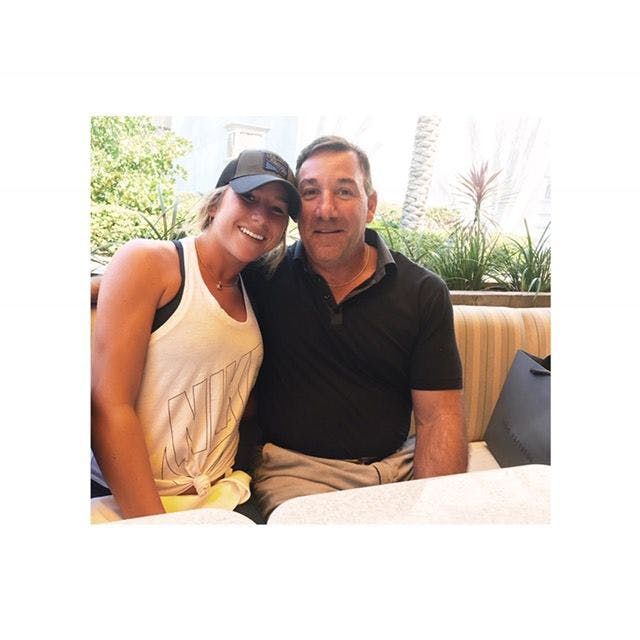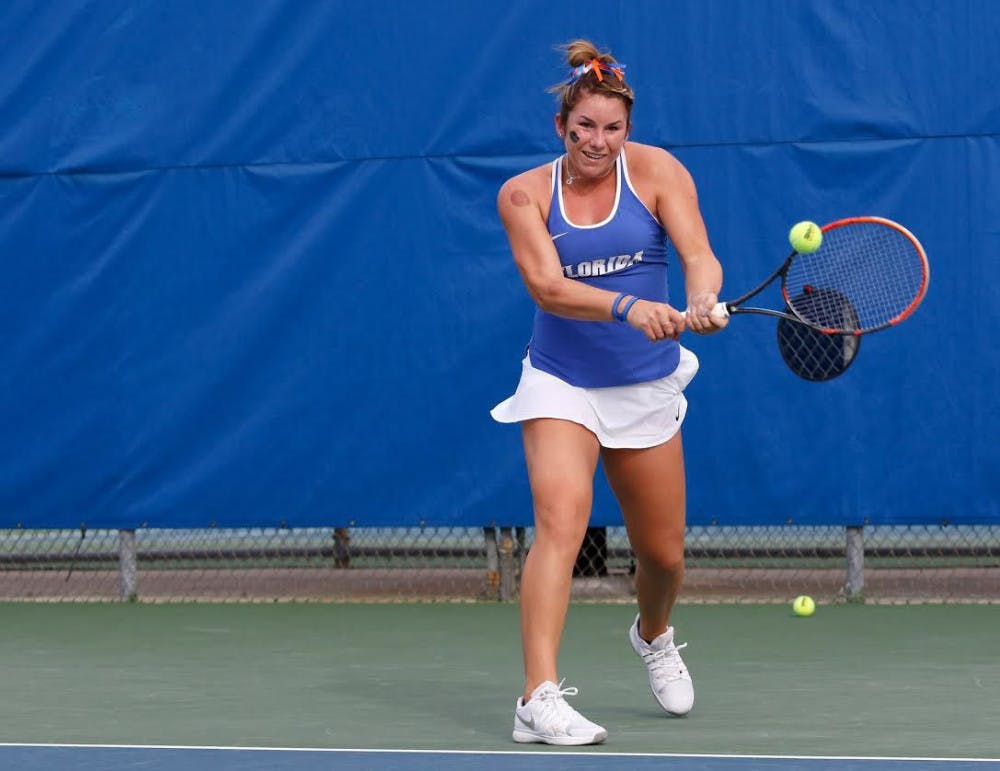When Victoria Emma takes the court this morning against LSU for the quarterfinal round of the SEC Tournament, there won’t be a smile on her face.
When she’s standing on the baseline, she won’t appear cheerful. She’ll only be focused on the point about to be played, and the next one, and the next one after that. And if the ball hits her opponent’s side of the court one final time to make the scoreboard read in her favor, maybe then there will be a change in her visage.
When she places her shot just right and her opponents look on in vain, she screams into the air with a fervor. When her adversary gets the best of her on a point, she doesn’t forget it.
Since she first picked up a racket at 3 years old, Victoria has been a competitor. As the daughter of a former NHL forward, Olympian and winner of collegiate hockey’s most prestigious award, Victoria’s ferocity on the court isn’t unprecedented.
But when a painful injury almost sidelined her father, David Emma, during one of the most important parts of his career over two decades ago, he refused to let it get in the way of his aspirations.
When the same thing happened to his daughter at 14 years old, David helped her through a situation all too familiar and watched on as she showcased the same competitive spirit he had years ago.
• • •

When David stepped on the ice to play against Finland ahead of the Winter Olympic Games in 1992, nothing seemed out of the ordinary. When he woke up the next morning and was having a hard time moving and breathing, however, it became increasingly clear his adrenaline had masked a devastating secret from him over the course of the previous day’s game. At some point in the contest, unbeknownst to him, he tore the cartilage in his rib cage. Suddenly, his opportunity to play in the Olympics was at risk.
David and the rest of the U.S. men’s ice hockey team were in Méribel, France, competing in a series of exhibitions before they headed to the Olympics in April. David was just one year removed from winning the Hobey Baker Award — given to the NCAA’s top male hockey player — at Boston College.
All was going well until the penultimate game before the Olympics, when David suffered his injury against Finland.
He was unable to compete in the team’s final prelim against Sweden. Dave Peterson, the team’s head coach, was unsure if David would be able to play in the Olympics and wanted to send him home.
David wasn’t having any of it.
“I told him, ‘Listen, I’ll be able to play, don’t you worry about me,’” David said.
He had been making his way through the Olympic ranks since he was 15 years old, and the assistant coaches who knew him well vouched for his toughness, lobbying for Peterson to let him stay on the team as the games began.
“They knew my character and the type of person I was,” David said.
When the U.S. finally took to the ice in Méribel for the Olympic Games in April, David returned to the team ahead of its second game against Germany. However, because the Olympics’ standards on drug testing were strict, he wasn’t allowed to be injected with Novocain or any other substance that could alleviate his pain.
If David was going to be an Olympian, he would have to play through the rest of the competition with torn cartilage in his ribs, and that’s exactly what he did.
“That’s part of sports,” David said. “You find ways to look on the good side of it.”
The team ended up placing fourth and barely missed out on the chance at a medal, but David was there every step of the way. Over the course of the Olympics, he recorded one assist and helped the U.S. finish the competition with a 5-2-1 record.
Twenty-two years later, David’s daughter would find herself in a similar situation, but she wouldn’t settle for fourth place.
• • •
Victoria was 14 years old and the 2014 National Clay Court Championships, one of the top youth tennis tournaments in the United States, was quickly approaching.
She had won the singles championship at the event two years prior, so she was no stranger to the tournament.
Victoria was excited to return to the competition for the 14-under division, but a few months before the tournament began, she started to feel an increasing amount of discomfort in her right shoulder. When she went to the doctors for an X-ray and an MRI, the source of her pain revealed itself.
Victoria had separated a growth plate in her shoulder, likely resulting from a combination of her growth and intense training regimen. According to the National Institute of Health, it’s a relatively common injury that occurs in adolescents and teens. Originally, doctors told Victoria that she was looking at a recovery time of two months and would still be able to make the tournament.
As it turned out, it wasn’t that simple. The recovery process took longer than expected. When she still wasn’t where she needed to be, her doctor recommended that she skip the tournament.
Because training for her upper body was out of the question, Victoria’s workout regimen during her injury consisted of running three 400-meter dashes on a track field. When she went to do them shortly after her injury, she barely made it past the first run before she broke down from the pain.
“I was dying,” Victoria recalled. “I told my dad to call an ambulance.”
David didn’t call an ambulance, but he did present Victoria with two choices: She could leave the track field, or she could finish her last 400, which she was required to run in under one minute and 30 seconds.
She finished the last 400 that day and, by the end of her recovery period, was running 10 of them in under one minute and 15 seconds.
Although her running was going well, Victoria was still heavily limited in her upper body training, and it was only a week before the tournament when she was able to train with a tennis racket. Despite her extremely limited practice time, Victoria wasn’t deterred.
“I knew that this was a big tournament for me, and that if I put in the work, it was going to pay off,” Victoria said.
When the tournament came around, Victoria’s injury still limited her.
She staved off six match points during the first round of the tournament and saw almost all of her matches go to three sets over the course of the tournament.
There were numerous points when David called Victoria’s mom, Jackie, when she was en route to the match and told her she might not want to come. Every match point could have been the end of Victoria’s tournament run, but she prevailed.
Victoria won them all, and when it came to the final match of the tournament, she found herself facing adversity again, winning the first set and losing the second.
“I told myself that I needed to be in the right mindset,” she said.
Victoria dominated the third set and won 6-0. Victoria never expected to win the tournament, but after a mere week of training and over three months of rehabilitation, she claimed her title as the clay court singles champion for the 14-under division.
• • •
Victoria attended Florida Virtual School during her senior year and was courted by the likes of LSU, Georgia, Vanderbilt, Auburn, Alabama, North Carolina, Duke and Pepperdine. But at the end of a long recruiting process, Victoria chose Florida.
David, who had gone through the recruiting process himself in his youth, helped her through the overwhelming process.
“There was a moment where Victoria came to me and said ‘Dad, please just tell me where to go,’” David said. “And I said to her, ‘Absolutely not. You need to make this decision, and no matter how much pressure you feel right now, I promise you you’ll make the right decision.’”
After being named SEC Freshman of the Week in February and playing a key role on a Gators squad that finished 9-2 in SEC play this season, it appears her decision was the right one.
Now, she and No. 2-seeded Florida will face LSU — one of the schools that recruited her — this morning at 9 in the quarterfinals of the SEC Tournament in Knoxville, Tennessee.
And as much as she wants to win a conference championship for her team, she also has her eyes set on something greater several years down the road.
Just like her father did with hockey, Victoria intends to pursue tennis at the professional level once her collegiate career is over. While David stressed that Victoria has all the physical talent to succeed at the next level, he often reminds her of the intangibles of being an athlete, such as handling an extended travel schedule, the ability to play through little rest and the necessity of being mentally engaged in the sport regardless of any other circumstances.
“It’s something Victoria and I talk about a lot,” he said. “It’s about taking care of what you can control and really making sure you have an incredible commitment to your process. That will lead you to success.”
River Wells is a sports writer for The Alligator. Follow him on Twitter @riverhwells and contact him at rwells@alligator.org.
Freshman Victoria Emma's grit while dealing with injuries has molded her into the player she is today.






